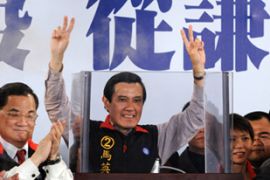Taiwan’s opposition wins election
Ma wins landslide election dominated by economic concerns and relations with China.

Published On 23 Mar 2008
“First is normalisation of (economic) relations, and then a peace agreement.”
“Before we can talk about peace, we need to remove the threat,” he said.
China has claimed Taiwan as its territory since the Island split from the mainland after a 1949 civil war.
It has threatened to bring the island under its control by force if necessary.
Strained relations
George Bush, the US president, sent his congratulations to Ma, saying his win was a new chance for China and Taiwan to resolve their differences.
“I believe the election provides a fresh opportunity for both sides (China and Taiwan) to reach out and engage one another in peacefully resolving their differences,” he said in a statement on Saturday.
The vote had been closely watched by Beijing and Washington for signs that a new relationship would emerge between China and Taiwan after eight years of recurring tensions under Chen Shui-bian, the outgoing president.
| Related stories | |
|
|
Final official figures by the election commission showed that Ma won 58.45 per cent of the vote, and Hsieh 41.55 per cent.
“Your voices are heard. People have the right to demand a better life. Only change can bring hope, only change can provide opportunities,” Ma told supporters.
At the same time, Hsieh conceded defeat in front of despondent Democratic Progressive Party (DPP) supporters at his own headquarters.
“We accept defeat. It’s my own defeat, it’s not the defeat of the Taiwanese people. Please don’t cry for me,” he said.
Ma will formally take over on May 20, when Chen steps down after serving a maximum two terms.
His victory gives the KMT overall control of the nation, as they had also crushed the DPP in parliamentary elections in January on the back of economic malaise and weariness over strained relations with China.
Economic ties
China and Taiwan have had virtually no direct links since the island split.
In his campaign Ma proposed an overhaul of economic ties to allow Taiwanese companies access to the vast mainland market while permitting China to invest in its domestic market.
Incomes are stagnant as the island, the world’s 17th largest economy, looses jobs and investment to mainland China.
“We have already reached some consensus on the normalisation of economic ties, direct air links, and on allowing more Chinese tourists, and it will be relatively easy to reach an agreement on those issues,” Ma said.
Richard Madsen, a professor of Chinese studies at the University of San Diego told Al Jazeera: “China had felt so provoked by the current president that it actually refused to haven any dialogue at all with Taiwan. So anything will be an improvement on that.
“Ma has in the last few weeks said some very harsh things about the government in China.
“He’s castigated them for what he’s called their brutal crackdown in Tibet.
“Its not at all clear there are going to be very warm relationships any time soon, but at least the opening for dialogue will be there”.
Separately, two referendums on joining the United Nations failed to muster enough turnout to make them valid, with less than 36 percent of voters making the effort.
The referendums were controversial because Taiwan lost its UN seat in 1971 to China, which has blocked its attempts to rejoin 15 times.
Source: News Agencies